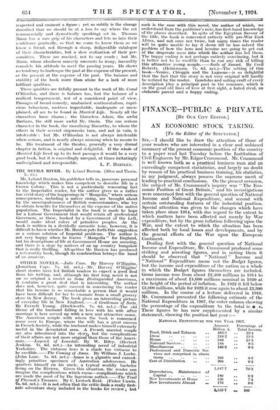OTHER NOVELS.—Julie Cane. By Harvey O'Higgins. (Jonathan Cape. 7s. 6d.
net.)—Mr. Harvey O'Higgins' short stories have led British readers to expect a good deal from his writing, and, although his first long novel is not on so original a model as Some Distinguished Americans, it contains a great deal that is interesting. The author does not, however, quite succeed in convincing the reader that his heroine is so remarkable a person that it would have been difficult for her to emanate from a small grocery store in New Jersey. The book gives an interestingylicture of everyday life in New England. A Gentleman of Sorts. By Everett Young. (Duckworth. 7s. 6d. net.)—The old theme of the husband 'falling in love with his wife after marriage is here served up with a new and attractive sauce. The American couple with whom the book is concerned conic over to Europe, where the wife has a great success in French Society, while the husband makes himself extremely useful in the devastated area A French married couple, are also introduced into the story, but the complications of their affairs are not more original than those of the Ameri- cans. Laycock of Lonedale. By W. Riley. (Herbert Jenkins. 7s. 6d. net.)—An interesting novel of industrial Yorkshire. The virtuous hero is a shade too virtuous to be credible.---The .Coming of Amos. By William -J. Locke. (John Lane. 7s. 6d. net.)—Amos is a gigantic and exceed- ingly primitive specimen of Australian adolescence. He quarters himself on his uncle, a typical worldly bachelor living on the Riviera. Given this situation, the reader can imagine the complications which ensue—complications which arc made the most of by the ingenious author.—The Trail of Pharaoh's Treasure. By C. Lestock Reid. (Fisher Unii in. 7a.. 6d. net.)—It is not often that the critic finds a really first- rate adventure story included in the books for review but such is the ease with this novel, the author of which, we understand from the publisher's note, has first-hand knowledge of the places described. In spite of the Egyptian flavour of the title, the book is concerned entirely with pre-War East Africa, and not once nor twice, but many times the reader will be quite unable to lay it down till he has solved the problem of how the hero and heroine are going to get out of the desperate mess into which the author .has led them. The happy ending is not perhaps entirely convincing, but it is better not to be credible than to run any risk of killing this attractive young couple. Sails of Sunset. By Cecil Roberts. (Heinemann. 7s. 6d. net.)—The setting of this book—Venice, Chioggia and the Lagoons—is -so delightful that the fact that the story is not very original will hardly be noticed by the reader. Gondolas and sailing craft of every description play a principal part in the romance, which is on the good old lines of love at first sight, a hated rival, an obdurate parent and a happy ending.










































 Previous page
Previous page